International Commercial Law: Beauty Bananas Ltd. Detailed Case Study
VerifiedAdded on 2024/07/12
|13
|3461
|463
Case Study
AI Summary
This assignment presents a case study concerning Beauty Bananas Ltd, a Brisbane-based company, and Fruit Fresh Inc, a China-based company, involving a contract for the sale of bananas. The analysis addresses two primary issues: compliance with Incoterms 2010 and CISG regarding the first shipment's quantity and timing, and the second shipment's quality and losses. It also examines China Fruit Shipping's liability for damages under the Hague Rules, focusing on seaworthiness, cargo damage, and potential bribery related to the bill of lading. The solution applies relevant legal principles to determine liabilities and obligations of each party, concluding that Beauty Bananas Ltd is liable for breaches related to late delivery and discrepancies in quantity and quality, while China Fruit Shipping's liability is assessed based on their negligence and adherence to maritime regulations. Desklib offers this and other solved assignments and past papers for students.
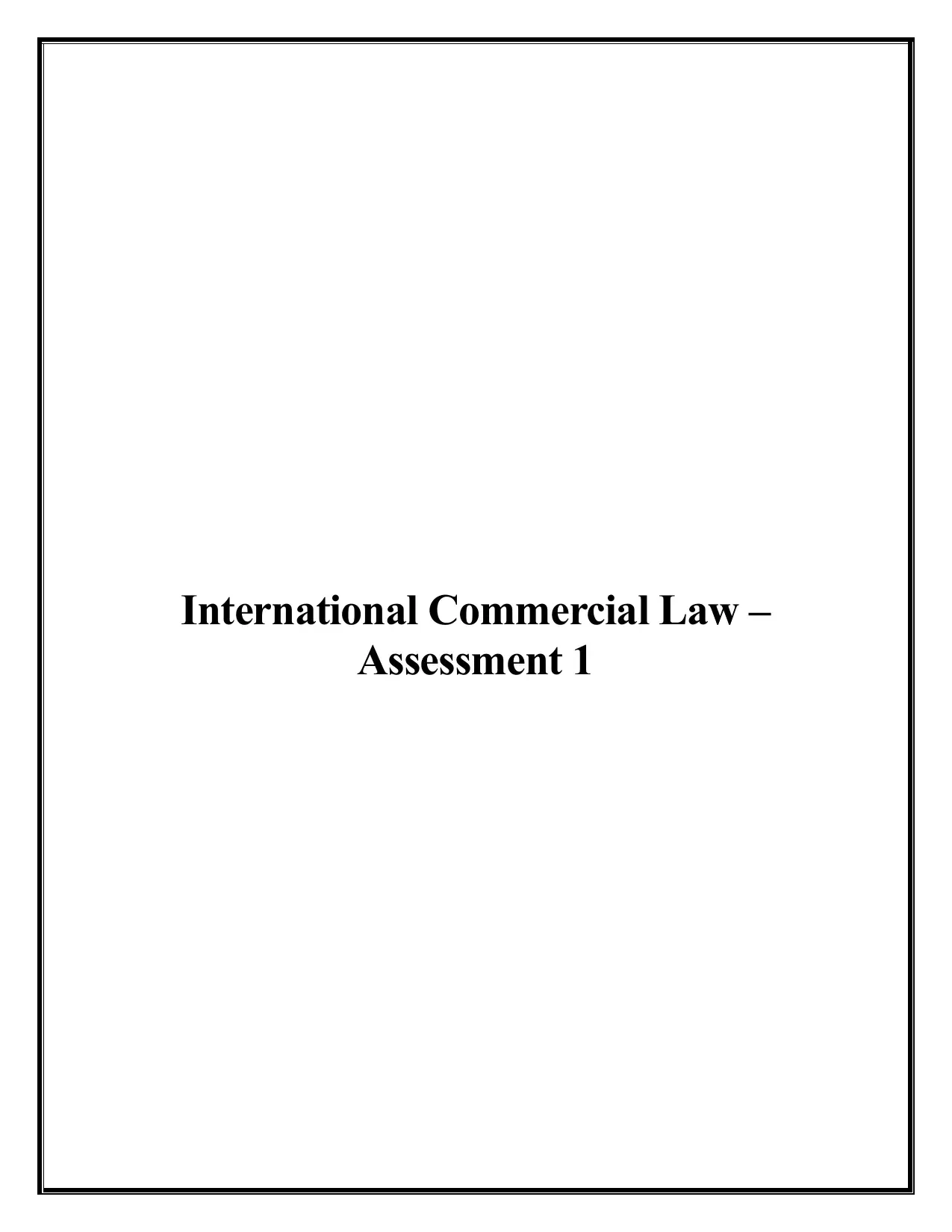
International Commercial Law –
Assessment 1
Assessment 1
Paraphrase This Document
Need a fresh take? Get an instant paraphrase of this document with our AI Paraphraser
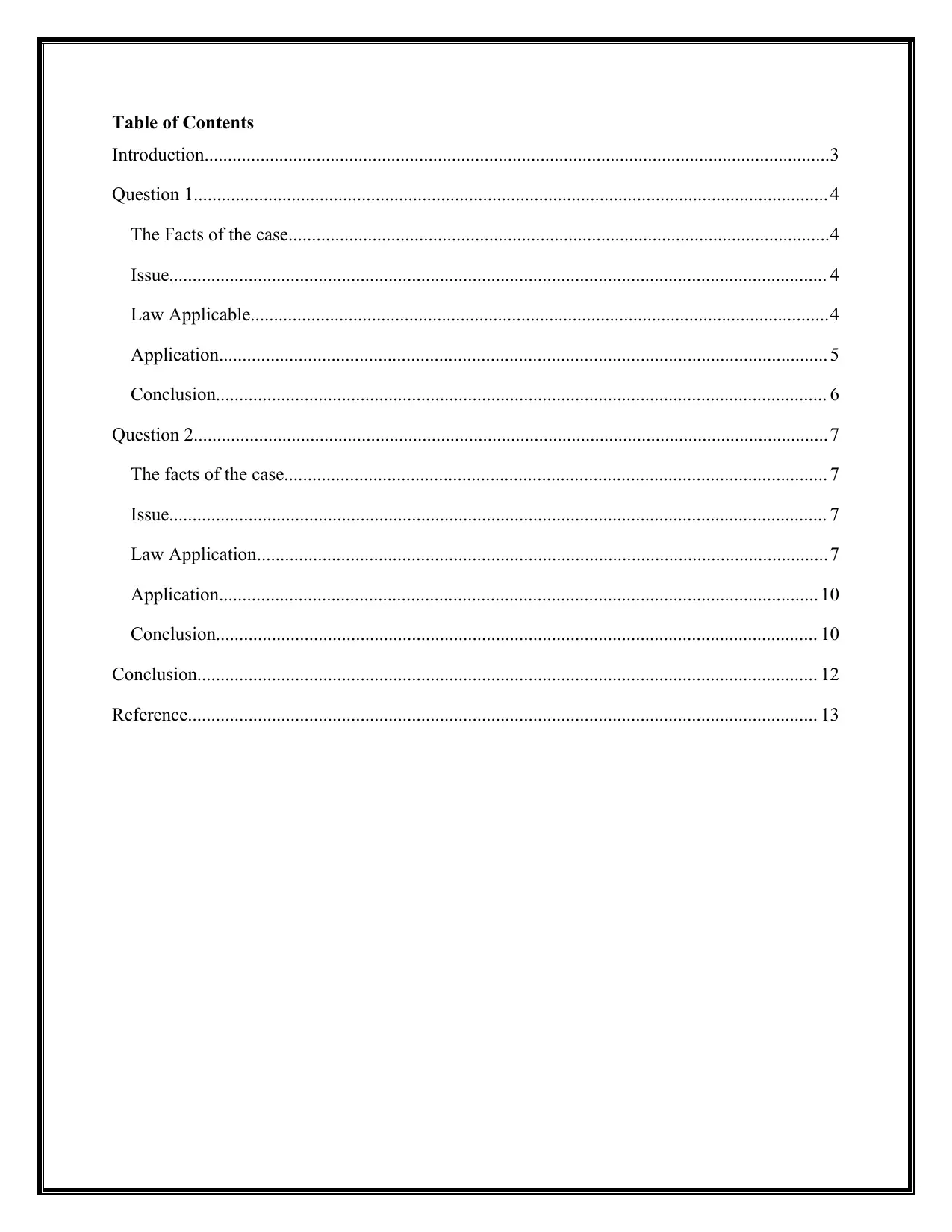
Table of Contents
Introduction......................................................................................................................................3
Question 1........................................................................................................................................ 4
The Facts of the case....................................................................................................................4
Issue............................................................................................................................................. 4
Law Applicable............................................................................................................................4
Application.................................................................................................................................. 5
Conclusion................................................................................................................................... 6
Question 2........................................................................................................................................ 7
The facts of the case.................................................................................................................... 7
Issue............................................................................................................................................. 7
Law Application..........................................................................................................................7
Application................................................................................................................................ 10
Conclusion................................................................................................................................. 10
Conclusion..................................................................................................................................... 12
Reference....................................................................................................................................... 13
Introduction......................................................................................................................................3
Question 1........................................................................................................................................ 4
The Facts of the case....................................................................................................................4
Issue............................................................................................................................................. 4
Law Applicable............................................................................................................................4
Application.................................................................................................................................. 5
Conclusion................................................................................................................................... 6
Question 2........................................................................................................................................ 7
The facts of the case.................................................................................................................... 7
Issue............................................................................................................................................. 7
Law Application..........................................................................................................................7
Application................................................................................................................................ 10
Conclusion................................................................................................................................. 10
Conclusion..................................................................................................................................... 12
Reference....................................................................................................................................... 13
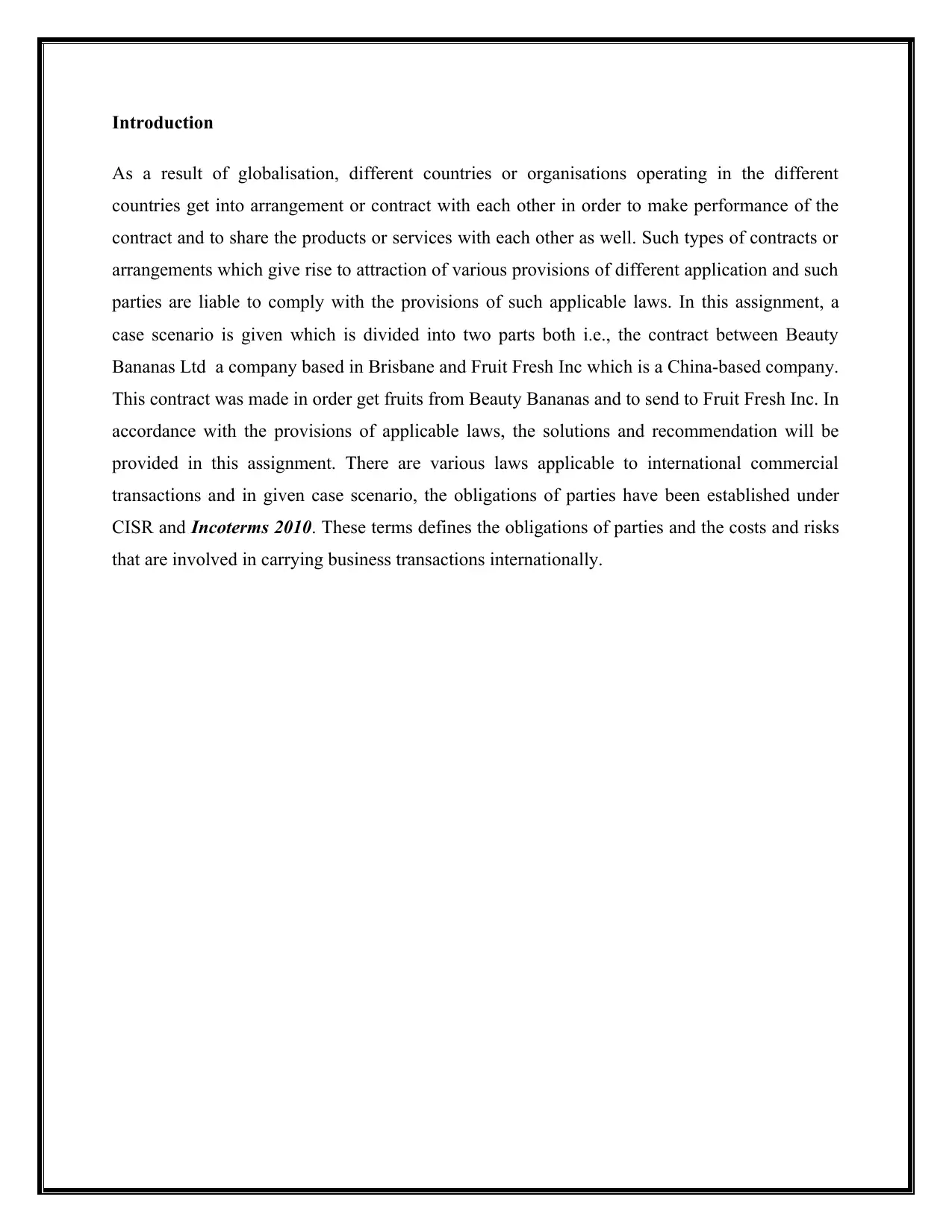
Introduction
As a result of globalisation, different countries or organisations operating in the different
countries get into arrangement or contract with each other in order to make performance of the
contract and to share the products or services with each other as well. Such types of contracts or
arrangements which give rise to attraction of various provisions of different application and such
parties are liable to comply with the provisions of such applicable laws. In this assignment, a
case scenario is given which is divided into two parts both i.e., the contract between Beauty
Bananas Ltd a company based in Brisbane and Fruit Fresh Inc which is a China-based company.
This contract was made in order get fruits from Beauty Bananas and to send to Fruit Fresh Inc. In
accordance with the provisions of applicable laws, the solutions and recommendation will be
provided in this assignment. There are various laws applicable to international commercial
transactions and in given case scenario, the obligations of parties have been established under
CISR and Incoterms 2010. These terms defines the obligations of parties and the costs and risks
that are involved in carrying business transactions internationally.
As a result of globalisation, different countries or organisations operating in the different
countries get into arrangement or contract with each other in order to make performance of the
contract and to share the products or services with each other as well. Such types of contracts or
arrangements which give rise to attraction of various provisions of different application and such
parties are liable to comply with the provisions of such applicable laws. In this assignment, a
case scenario is given which is divided into two parts both i.e., the contract between Beauty
Bananas Ltd a company based in Brisbane and Fruit Fresh Inc which is a China-based company.
This contract was made in order get fruits from Beauty Bananas and to send to Fruit Fresh Inc. In
accordance with the provisions of applicable laws, the solutions and recommendation will be
provided in this assignment. There are various laws applicable to international commercial
transactions and in given case scenario, the obligations of parties have been established under
CISR and Incoterms 2010. These terms defines the obligations of parties and the costs and risks
that are involved in carrying business transactions internationally.
⊘ This is a preview!⊘
Do you want full access?
Subscribe today to unlock all pages.

Trusted by 1+ million students worldwide
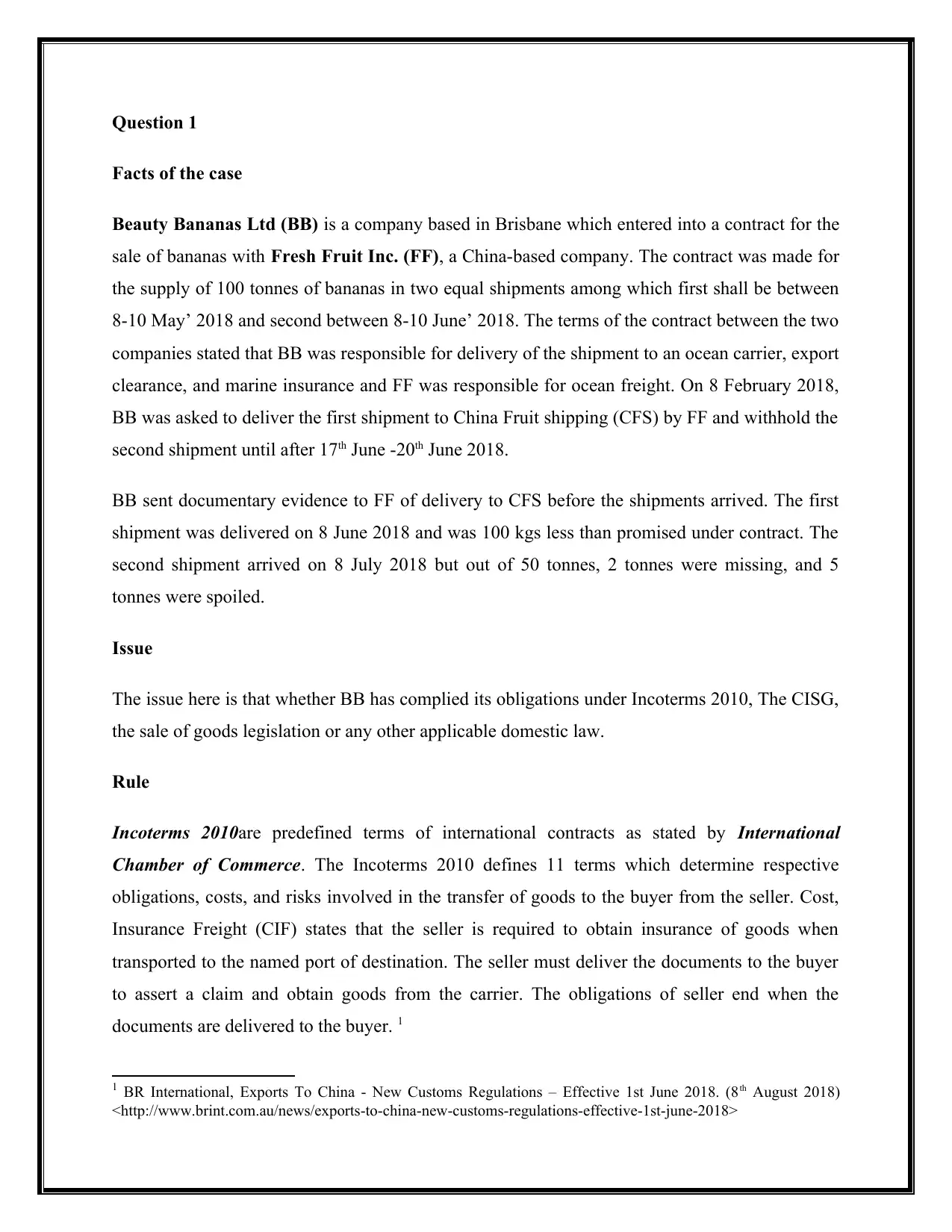
Question 1
Facts of the case
Beauty Bananas Ltd (BB) is a company based in Brisbane which entered into a contract for the
sale of bananas with Fresh Fruit Inc. (FF), a China-based company. The contract was made for
the supply of 100 tonnes of bananas in two equal shipments among which first shall be between
8-10 May’ 2018 and second between 8-10 June’ 2018. The terms of the contract between the two
companies stated that BB was responsible for delivery of the shipment to an ocean carrier, export
clearance, and marine insurance and FF was responsible for ocean freight. On 8 February 2018,
BB was asked to deliver the first shipment to China Fruit shipping (CFS) by FF and withhold the
second shipment until after 17th June -20th June 2018.
BB sent documentary evidence to FF of delivery to CFS before the shipments arrived. The first
shipment was delivered on 8 June 2018 and was 100 kgs less than promised under contract. The
second shipment arrived on 8 July 2018 but out of 50 tonnes, 2 tonnes were missing, and 5
tonnes were spoiled.
Issue
The issue here is that whether BB has complied its obligations under Incoterms 2010, The CISG,
the sale of goods legislation or any other applicable domestic law.
Rule
Incoterms 2010are predefined terms of international contracts as stated by International
Chamber of Commerce. The Incoterms 2010 defines 11 terms which determine respective
obligations, costs, and risks involved in the transfer of goods to the buyer from the seller. Cost,
Insurance Freight (CIF) states that the seller is required to obtain insurance of goods when
transported to the named port of destination. The seller must deliver the documents to the buyer
to assert a claim and obtain goods from the carrier. The obligations of seller end when the
documents are delivered to the buyer. 1
1 BR International, Exports To China - New Customs Regulations – Effective 1st June 2018. (8th August 2018)
<http://www.brint.com.au/news/exports-to-china-new-customs-regulations-effective-1st-june-2018>
Facts of the case
Beauty Bananas Ltd (BB) is a company based in Brisbane which entered into a contract for the
sale of bananas with Fresh Fruit Inc. (FF), a China-based company. The contract was made for
the supply of 100 tonnes of bananas in two equal shipments among which first shall be between
8-10 May’ 2018 and second between 8-10 June’ 2018. The terms of the contract between the two
companies stated that BB was responsible for delivery of the shipment to an ocean carrier, export
clearance, and marine insurance and FF was responsible for ocean freight. On 8 February 2018,
BB was asked to deliver the first shipment to China Fruit shipping (CFS) by FF and withhold the
second shipment until after 17th June -20th June 2018.
BB sent documentary evidence to FF of delivery to CFS before the shipments arrived. The first
shipment was delivered on 8 June 2018 and was 100 kgs less than promised under contract. The
second shipment arrived on 8 July 2018 but out of 50 tonnes, 2 tonnes were missing, and 5
tonnes were spoiled.
Issue
The issue here is that whether BB has complied its obligations under Incoterms 2010, The CISG,
the sale of goods legislation or any other applicable domestic law.
Rule
Incoterms 2010are predefined terms of international contracts as stated by International
Chamber of Commerce. The Incoterms 2010 defines 11 terms which determine respective
obligations, costs, and risks involved in the transfer of goods to the buyer from the seller. Cost,
Insurance Freight (CIF) states that the seller is required to obtain insurance of goods when
transported to the named port of destination. The seller must deliver the documents to the buyer
to assert a claim and obtain goods from the carrier. The obligations of seller end when the
documents are delivered to the buyer. 1
1 BR International, Exports To China - New Customs Regulations – Effective 1st June 2018. (8th August 2018)
<http://www.brint.com.au/news/exports-to-china-new-customs-regulations-effective-1st-june-2018>
Paraphrase This Document
Need a fresh take? Get an instant paraphrase of this document with our AI Paraphraser
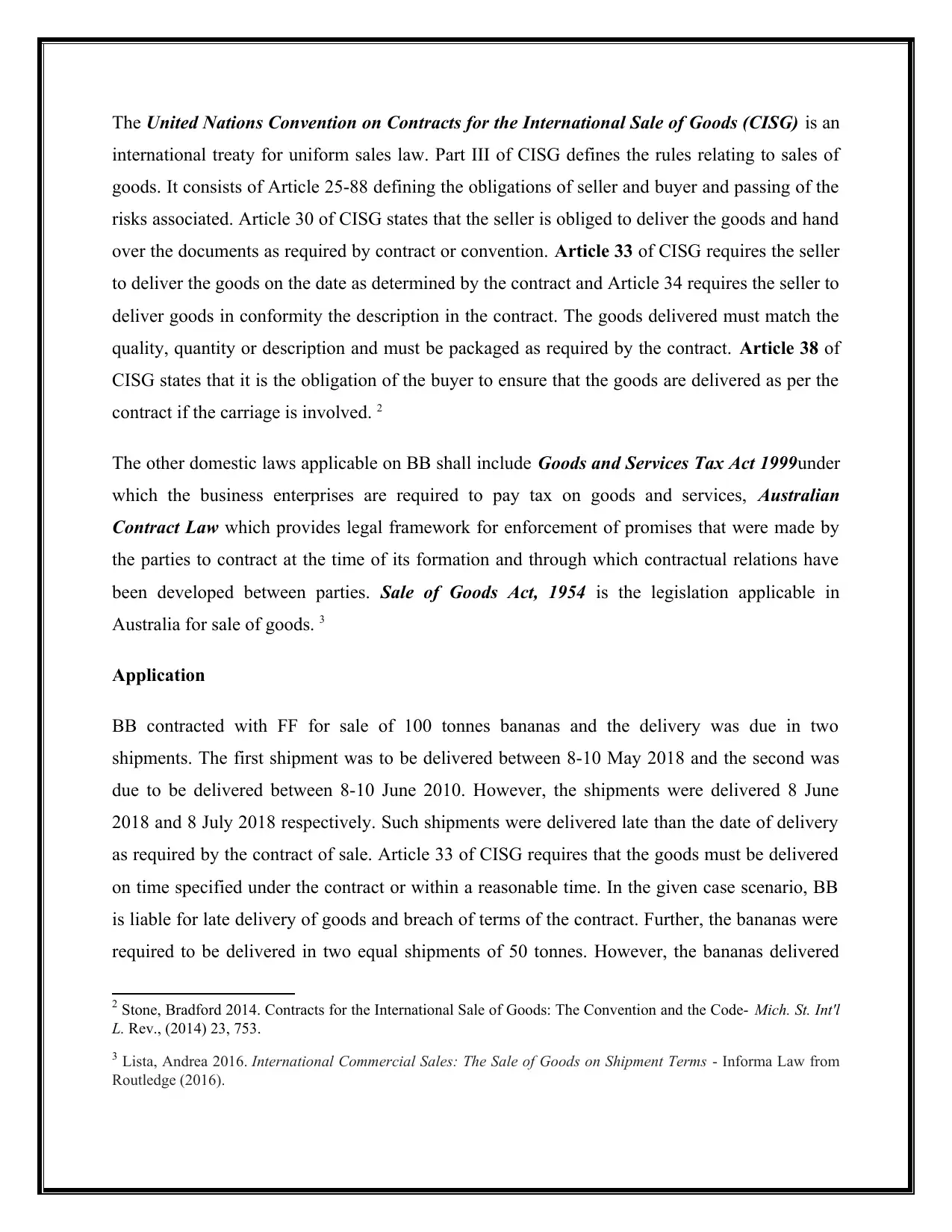
The United Nations Convention on Contracts for the International Sale of Goods (CISG) is an
international treaty for uniform sales law. Part III of CISG defines the rules relating to sales of
goods. It consists of Article 25-88 defining the obligations of seller and buyer and passing of the
risks associated. Article 30 of CISG states that the seller is obliged to deliver the goods and hand
over the documents as required by contract or convention. Article 33 of CISG requires the seller
to deliver the goods on the date as determined by the contract and Article 34 requires the seller to
deliver goods in conformity the description in the contract. The goods delivered must match the
quality, quantity or description and must be packaged as required by the contract. Article 38 of
CISG states that it is the obligation of the buyer to ensure that the goods are delivered as per the
contract if the carriage is involved. 2
The other domestic laws applicable on BB shall include Goods and Services Tax Act 1999under
which the business enterprises are required to pay tax on goods and services, Australian
Contract Law which provides legal framework for enforcement of promises that were made by
the parties to contract at the time of its formation and through which contractual relations have
been developed between parties. Sale of Goods Act, 1954 is the legislation applicable in
Australia for sale of goods. 3
Application
BB contracted with FF for sale of 100 tonnes bananas and the delivery was due in two
shipments. The first shipment was to be delivered between 8-10 May 2018 and the second was
due to be delivered between 8-10 June 2010. However, the shipments were delivered 8 June
2018 and 8 July 2018 respectively. Such shipments were delivered late than the date of delivery
as required by the contract of sale. Article 33 of CISG requires that the goods must be delivered
on time specified under the contract or within a reasonable time. In the given case scenario, BB
is liable for late delivery of goods and breach of terms of the contract. Further, the bananas were
required to be delivered in two equal shipments of 50 tonnes. However, the bananas delivered
2 Stone, Bradford 2014. Contracts for the International Sale of Goods: The Convention and the Code- Mich. St. Int'l
L. Rev., (2014) 23, 753.
3 Lista, Andrea 2016. International Commercial Sales: The Sale of Goods on Shipment Terms - Informa Law from
Routledge (2016).
international treaty for uniform sales law. Part III of CISG defines the rules relating to sales of
goods. It consists of Article 25-88 defining the obligations of seller and buyer and passing of the
risks associated. Article 30 of CISG states that the seller is obliged to deliver the goods and hand
over the documents as required by contract or convention. Article 33 of CISG requires the seller
to deliver the goods on the date as determined by the contract and Article 34 requires the seller to
deliver goods in conformity the description in the contract. The goods delivered must match the
quality, quantity or description and must be packaged as required by the contract. Article 38 of
CISG states that it is the obligation of the buyer to ensure that the goods are delivered as per the
contract if the carriage is involved. 2
The other domestic laws applicable on BB shall include Goods and Services Tax Act 1999under
which the business enterprises are required to pay tax on goods and services, Australian
Contract Law which provides legal framework for enforcement of promises that were made by
the parties to contract at the time of its formation and through which contractual relations have
been developed between parties. Sale of Goods Act, 1954 is the legislation applicable in
Australia for sale of goods. 3
Application
BB contracted with FF for sale of 100 tonnes bananas and the delivery was due in two
shipments. The first shipment was to be delivered between 8-10 May 2018 and the second was
due to be delivered between 8-10 June 2010. However, the shipments were delivered 8 June
2018 and 8 July 2018 respectively. Such shipments were delivered late than the date of delivery
as required by the contract of sale. Article 33 of CISG requires that the goods must be delivered
on time specified under the contract or within a reasonable time. In the given case scenario, BB
is liable for late delivery of goods and breach of terms of the contract. Further, the bananas were
required to be delivered in two equal shipments of 50 tonnes. However, the bananas delivered
2 Stone, Bradford 2014. Contracts for the International Sale of Goods: The Convention and the Code- Mich. St. Int'l
L. Rev., (2014) 23, 753.
3 Lista, Andrea 2016. International Commercial Sales: The Sale of Goods on Shipment Terms - Informa Law from
Routledge (2016).
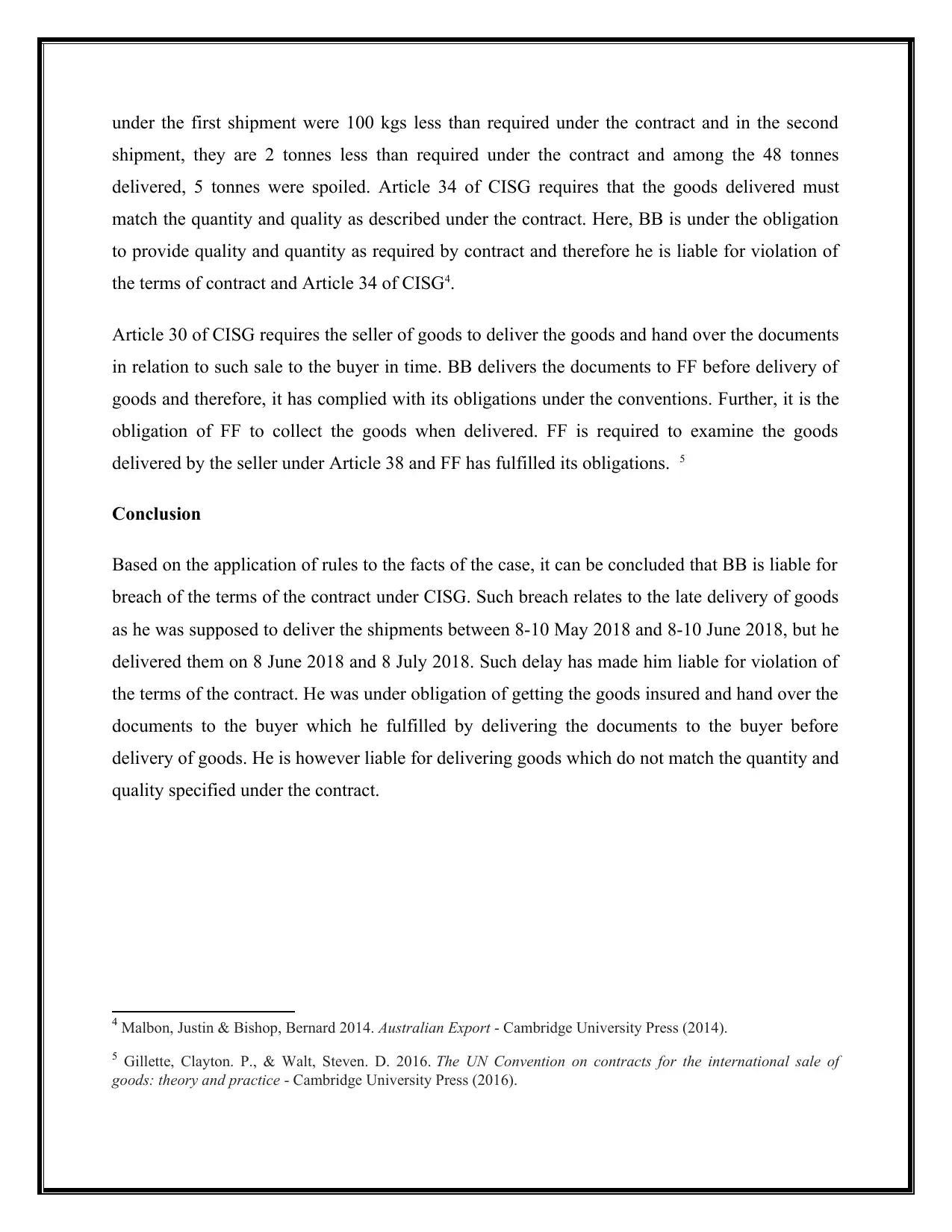
under the first shipment were 100 kgs less than required under the contract and in the second
shipment, they are 2 tonnes less than required under the contract and among the 48 tonnes
delivered, 5 tonnes were spoiled. Article 34 of CISG requires that the goods delivered must
match the quantity and quality as described under the contract. Here, BB is under the obligation
to provide quality and quantity as required by contract and therefore he is liable for violation of
the terms of contract and Article 34 of CISG4.
Article 30 of CISG requires the seller of goods to deliver the goods and hand over the documents
in relation to such sale to the buyer in time. BB delivers the documents to FF before delivery of
goods and therefore, it has complied with its obligations under the conventions. Further, it is the
obligation of FF to collect the goods when delivered. FF is required to examine the goods
delivered by the seller under Article 38 and FF has fulfilled its obligations. 5
Conclusion
Based on the application of rules to the facts of the case, it can be concluded that BB is liable for
breach of the terms of the contract under CISG. Such breach relates to the late delivery of goods
as he was supposed to deliver the shipments between 8-10 May 2018 and 8-10 June 2018, but he
delivered them on 8 June 2018 and 8 July 2018. Such delay has made him liable for violation of
the terms of the contract. He was under obligation of getting the goods insured and hand over the
documents to the buyer which he fulfilled by delivering the documents to the buyer before
delivery of goods. He is however liable for delivering goods which do not match the quantity and
quality specified under the contract.
4 Malbon, Justin & Bishop, Bernard 2014. Australian Export - Cambridge University Press (2014).
5 Gillette, Clayton. P., & Walt, Steven. D. 2016. The UN Convention on contracts for the international sale of
goods: theory and practice - Cambridge University Press (2016).
shipment, they are 2 tonnes less than required under the contract and among the 48 tonnes
delivered, 5 tonnes were spoiled. Article 34 of CISG requires that the goods delivered must
match the quantity and quality as described under the contract. Here, BB is under the obligation
to provide quality and quantity as required by contract and therefore he is liable for violation of
the terms of contract and Article 34 of CISG4.
Article 30 of CISG requires the seller of goods to deliver the goods and hand over the documents
in relation to such sale to the buyer in time. BB delivers the documents to FF before delivery of
goods and therefore, it has complied with its obligations under the conventions. Further, it is the
obligation of FF to collect the goods when delivered. FF is required to examine the goods
delivered by the seller under Article 38 and FF has fulfilled its obligations. 5
Conclusion
Based on the application of rules to the facts of the case, it can be concluded that BB is liable for
breach of the terms of the contract under CISG. Such breach relates to the late delivery of goods
as he was supposed to deliver the shipments between 8-10 May 2018 and 8-10 June 2018, but he
delivered them on 8 June 2018 and 8 July 2018. Such delay has made him liable for violation of
the terms of the contract. He was under obligation of getting the goods insured and hand over the
documents to the buyer which he fulfilled by delivering the documents to the buyer before
delivery of goods. He is however liable for delivering goods which do not match the quantity and
quality specified under the contract.
4 Malbon, Justin & Bishop, Bernard 2014. Australian Export - Cambridge University Press (2014).
5 Gillette, Clayton. P., & Walt, Steven. D. 2016. The UN Convention on contracts for the international sale of
goods: theory and practice - Cambridge University Press (2016).
⊘ This is a preview!⊘
Do you want full access?
Subscribe today to unlock all pages.

Trusted by 1+ million students worldwide
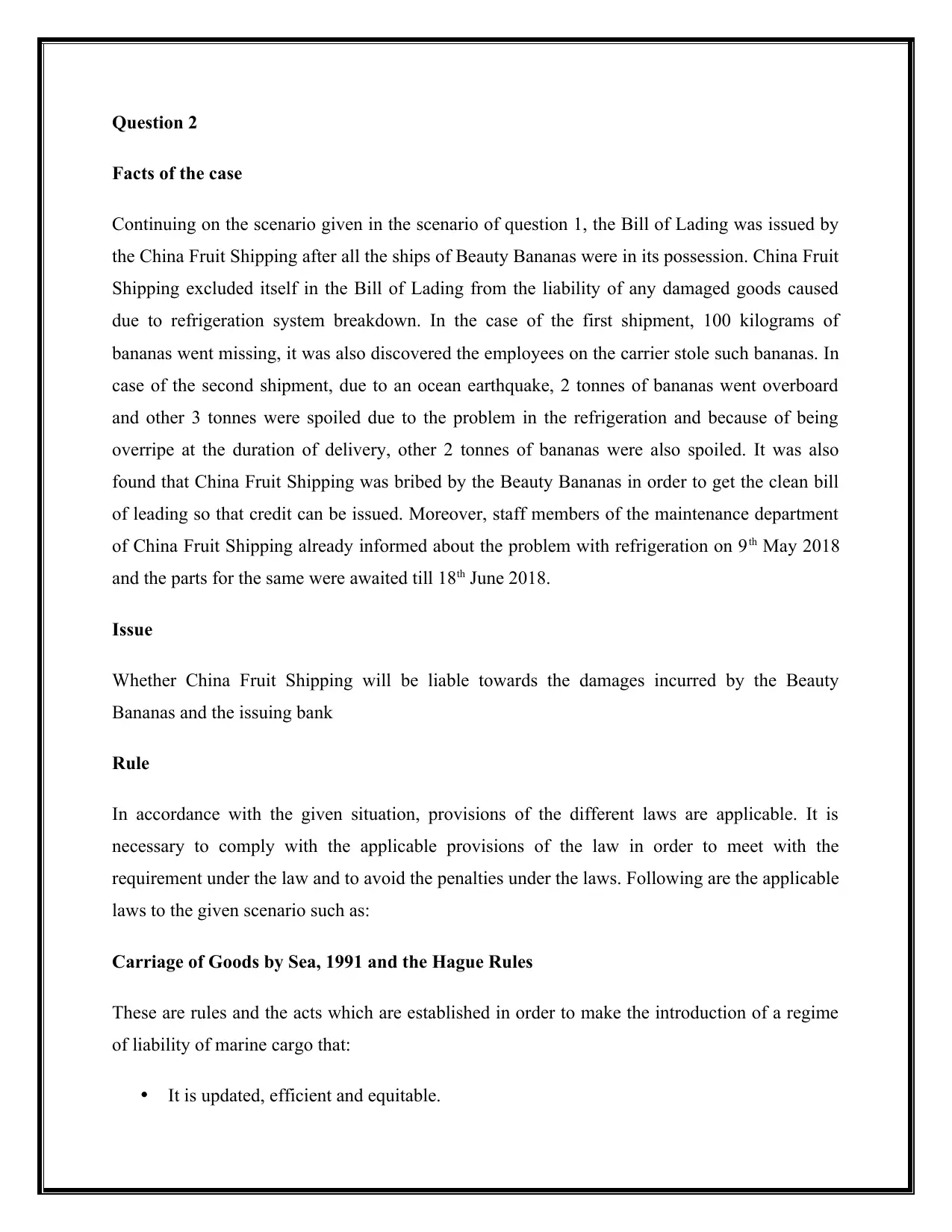
Question 2
Facts of the case
Continuing on the scenario given in the scenario of question 1, the Bill of Lading was issued by
the China Fruit Shipping after all the ships of Beauty Bananas were in its possession. China Fruit
Shipping excluded itself in the Bill of Lading from the liability of any damaged goods caused
due to refrigeration system breakdown. In the case of the first shipment, 100 kilograms of
bananas went missing, it was also discovered the employees on the carrier stole such bananas. In
case of the second shipment, due to an ocean earthquake, 2 tonnes of bananas went overboard
and other 3 tonnes were spoiled due to the problem in the refrigeration and because of being
overripe at the duration of delivery, other 2 tonnes of bananas were also spoiled. It was also
found that China Fruit Shipping was bribed by the Beauty Bananas in order to get the clean bill
of leading so that credit can be issued. Moreover, staff members of the maintenance department
of China Fruit Shipping already informed about the problem with refrigeration on 9th May 2018
and the parts for the same were awaited till 18th June 2018.
Issue
Whether China Fruit Shipping will be liable towards the damages incurred by the Beauty
Bananas and the issuing bank
Rule
In accordance with the given situation, provisions of the different laws are applicable. It is
necessary to comply with the applicable provisions of the law in order to meet with the
requirement under the law and to avoid the penalties under the laws. Following are the applicable
laws to the given scenario such as:
Carriage of Goods by Sea, 1991 and the Hague Rules
These are rules and the acts which are established in order to make the introduction of a regime
of liability of marine cargo that:
It is updated, efficient and equitable.
Facts of the case
Continuing on the scenario given in the scenario of question 1, the Bill of Lading was issued by
the China Fruit Shipping after all the ships of Beauty Bananas were in its possession. China Fruit
Shipping excluded itself in the Bill of Lading from the liability of any damaged goods caused
due to refrigeration system breakdown. In the case of the first shipment, 100 kilograms of
bananas went missing, it was also discovered the employees on the carrier stole such bananas. In
case of the second shipment, due to an ocean earthquake, 2 tonnes of bananas went overboard
and other 3 tonnes were spoiled due to the problem in the refrigeration and because of being
overripe at the duration of delivery, other 2 tonnes of bananas were also spoiled. It was also
found that China Fruit Shipping was bribed by the Beauty Bananas in order to get the clean bill
of leading so that credit can be issued. Moreover, staff members of the maintenance department
of China Fruit Shipping already informed about the problem with refrigeration on 9th May 2018
and the parts for the same were awaited till 18th June 2018.
Issue
Whether China Fruit Shipping will be liable towards the damages incurred by the Beauty
Bananas and the issuing bank
Rule
In accordance with the given situation, provisions of the different laws are applicable. It is
necessary to comply with the applicable provisions of the law in order to meet with the
requirement under the law and to avoid the penalties under the laws. Following are the applicable
laws to the given scenario such as:
Carriage of Goods by Sea, 1991 and the Hague Rules
These are rules and the acts which are established in order to make the introduction of a regime
of liability of marine cargo that:
It is updated, efficient and equitable.
Paraphrase This Document
Need a fresh take? Get an instant paraphrase of this document with our AI Paraphraser
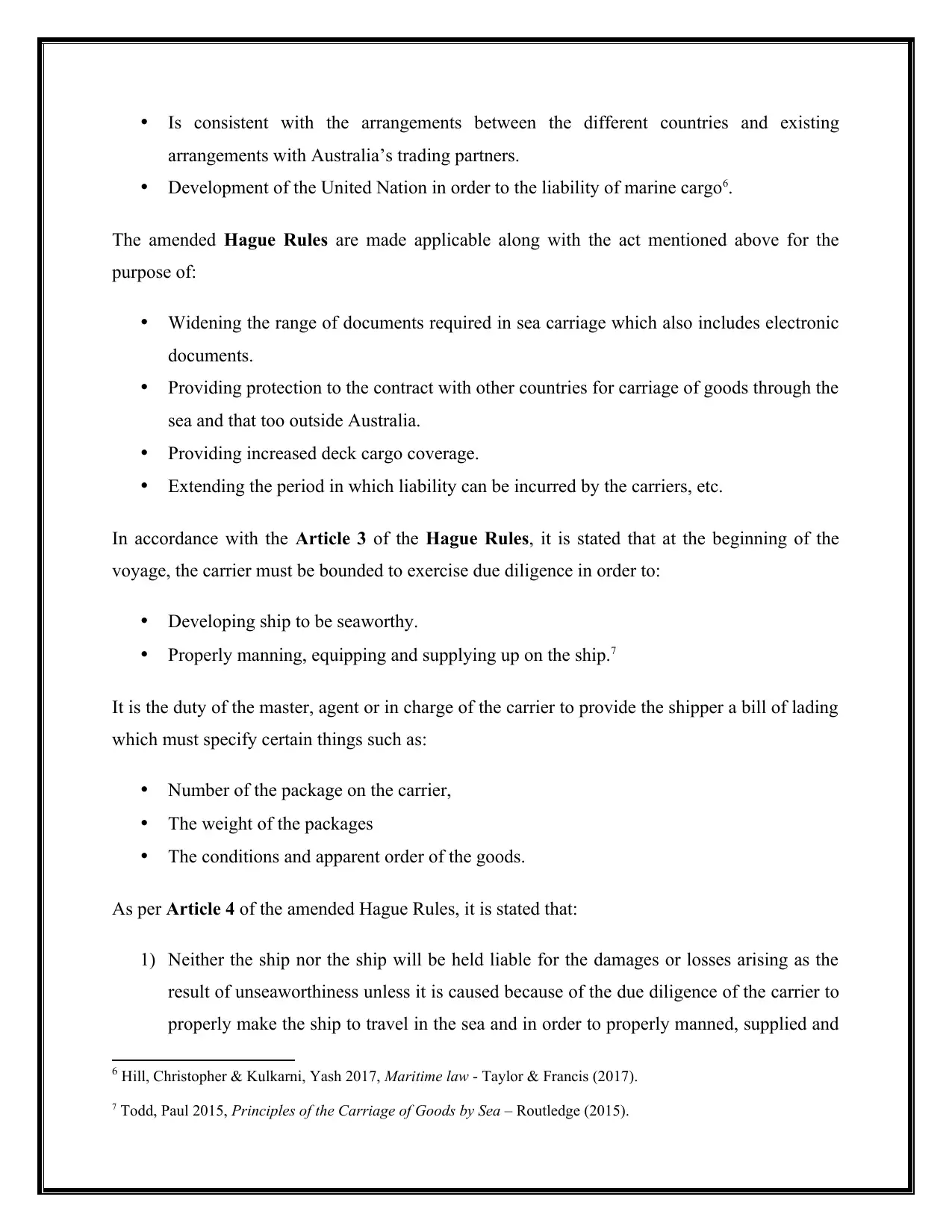
Is consistent with the arrangements between the different countries and existing
arrangements with Australia’s trading partners.
Development of the United Nation in order to the liability of marine cargo6.
The amended Hague Rules are made applicable along with the act mentioned above for the
purpose of:
Widening the range of documents required in sea carriage which also includes electronic
documents.
Providing protection to the contract with other countries for carriage of goods through the
sea and that too outside Australia.
Providing increased deck cargo coverage.
Extending the period in which liability can be incurred by the carriers, etc.
In accordance with the Article 3 of the Hague Rules, it is stated that at the beginning of the
voyage, the carrier must be bounded to exercise due diligence in order to:
Developing ship to be seaworthy.
Properly manning, equipping and supplying up on the ship.7
It is the duty of the master, agent or in charge of the carrier to provide the shipper a bill of lading
which must specify certain things such as:
Number of the package on the carrier,
The weight of the packages
The conditions and apparent order of the goods.
As per Article 4 of the amended Hague Rules, it is stated that:
1) Neither the ship nor the ship will be held liable for the damages or losses arising as the
result of unseaworthiness unless it is caused because of the due diligence of the carrier to
properly make the ship to travel in the sea and in order to properly manned, supplied and
6 Hill, Christopher & Kulkarni, Yash 2017, Maritime law - Taylor & Francis (2017).
7 Todd, Paul 2015, Principles of the Carriage of Goods by Sea – Routledge (2015).
arrangements with Australia’s trading partners.
Development of the United Nation in order to the liability of marine cargo6.
The amended Hague Rules are made applicable along with the act mentioned above for the
purpose of:
Widening the range of documents required in sea carriage which also includes electronic
documents.
Providing protection to the contract with other countries for carriage of goods through the
sea and that too outside Australia.
Providing increased deck cargo coverage.
Extending the period in which liability can be incurred by the carriers, etc.
In accordance with the Article 3 of the Hague Rules, it is stated that at the beginning of the
voyage, the carrier must be bounded to exercise due diligence in order to:
Developing ship to be seaworthy.
Properly manning, equipping and supplying up on the ship.7
It is the duty of the master, agent or in charge of the carrier to provide the shipper a bill of lading
which must specify certain things such as:
Number of the package on the carrier,
The weight of the packages
The conditions and apparent order of the goods.
As per Article 4 of the amended Hague Rules, it is stated that:
1) Neither the ship nor the ship will be held liable for the damages or losses arising as the
result of unseaworthiness unless it is caused because of the due diligence of the carrier to
properly make the ship to travel in the sea and in order to properly manned, supplied and
6 Hill, Christopher & Kulkarni, Yash 2017, Maritime law - Taylor & Francis (2017).
7 Todd, Paul 2015, Principles of the Carriage of Goods by Sea – Routledge (2015).
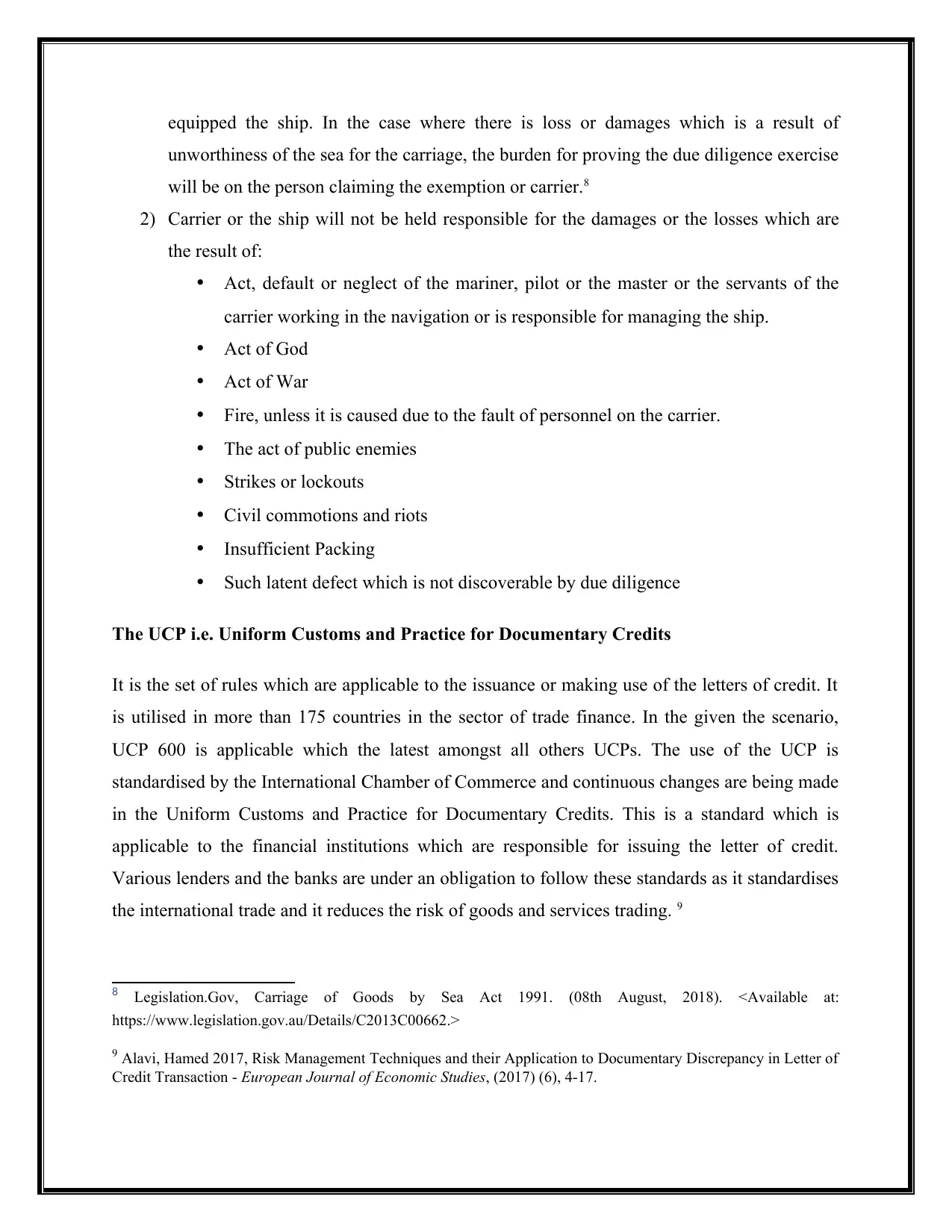
equipped the ship. In the case where there is loss or damages which is a result of
unworthiness of the sea for the carriage, the burden for proving the due diligence exercise
will be on the person claiming the exemption or carrier.8
2) Carrier or the ship will not be held responsible for the damages or the losses which are
the result of:
Act, default or neglect of the mariner, pilot or the master or the servants of the
carrier working in the navigation or is responsible for managing the ship.
Act of God
Act of War
Fire, unless it is caused due to the fault of personnel on the carrier.
The act of public enemies
Strikes or lockouts
Civil commotions and riots
Insufficient Packing
Such latent defect which is not discoverable by due diligence
The UCP i.e. Uniform Customs and Practice for Documentary Credits
It is the set of rules which are applicable to the issuance or making use of the letters of credit. It
is utilised in more than 175 countries in the sector of trade finance. In the given the scenario,
UCP 600 is applicable which the latest amongst all others UCPs. The use of the UCP is
standardised by the International Chamber of Commerce and continuous changes are being made
in the Uniform Customs and Practice for Documentary Credits. This is a standard which is
applicable to the financial institutions which are responsible for issuing the letter of credit.
Various lenders and the banks are under an obligation to follow these standards as it standardises
the international trade and it reduces the risk of goods and services trading. 9
8 Legislation.Gov, Carriage of Goods by Sea Act 1991. (08th August, 2018). <Available at:
https://www.legislation.gov.au/Details/C2013C00662.>
9 Alavi, Hamed 2017, Risk Management Techniques and their Application to Documentary Discrepancy in Letter of
Credit Transaction - European Journal of Economic Studies, (2017) (6), 4-17.
unworthiness of the sea for the carriage, the burden for proving the due diligence exercise
will be on the person claiming the exemption or carrier.8
2) Carrier or the ship will not be held responsible for the damages or the losses which are
the result of:
Act, default or neglect of the mariner, pilot or the master or the servants of the
carrier working in the navigation or is responsible for managing the ship.
Act of God
Act of War
Fire, unless it is caused due to the fault of personnel on the carrier.
The act of public enemies
Strikes or lockouts
Civil commotions and riots
Insufficient Packing
Such latent defect which is not discoverable by due diligence
The UCP i.e. Uniform Customs and Practice for Documentary Credits
It is the set of rules which are applicable to the issuance or making use of the letters of credit. It
is utilised in more than 175 countries in the sector of trade finance. In the given the scenario,
UCP 600 is applicable which the latest amongst all others UCPs. The use of the UCP is
standardised by the International Chamber of Commerce and continuous changes are being made
in the Uniform Customs and Practice for Documentary Credits. This is a standard which is
applicable to the financial institutions which are responsible for issuing the letter of credit.
Various lenders and the banks are under an obligation to follow these standards as it standardises
the international trade and it reduces the risk of goods and services trading. 9
8 Legislation.Gov, Carriage of Goods by Sea Act 1991. (08th August, 2018). <Available at:
https://www.legislation.gov.au/Details/C2013C00662.>
9 Alavi, Hamed 2017, Risk Management Techniques and their Application to Documentary Discrepancy in Letter of
Credit Transaction - European Journal of Economic Studies, (2017) (6), 4-17.
⊘ This is a preview!⊘
Do you want full access?
Subscribe today to unlock all pages.

Trusted by 1+ million students worldwide
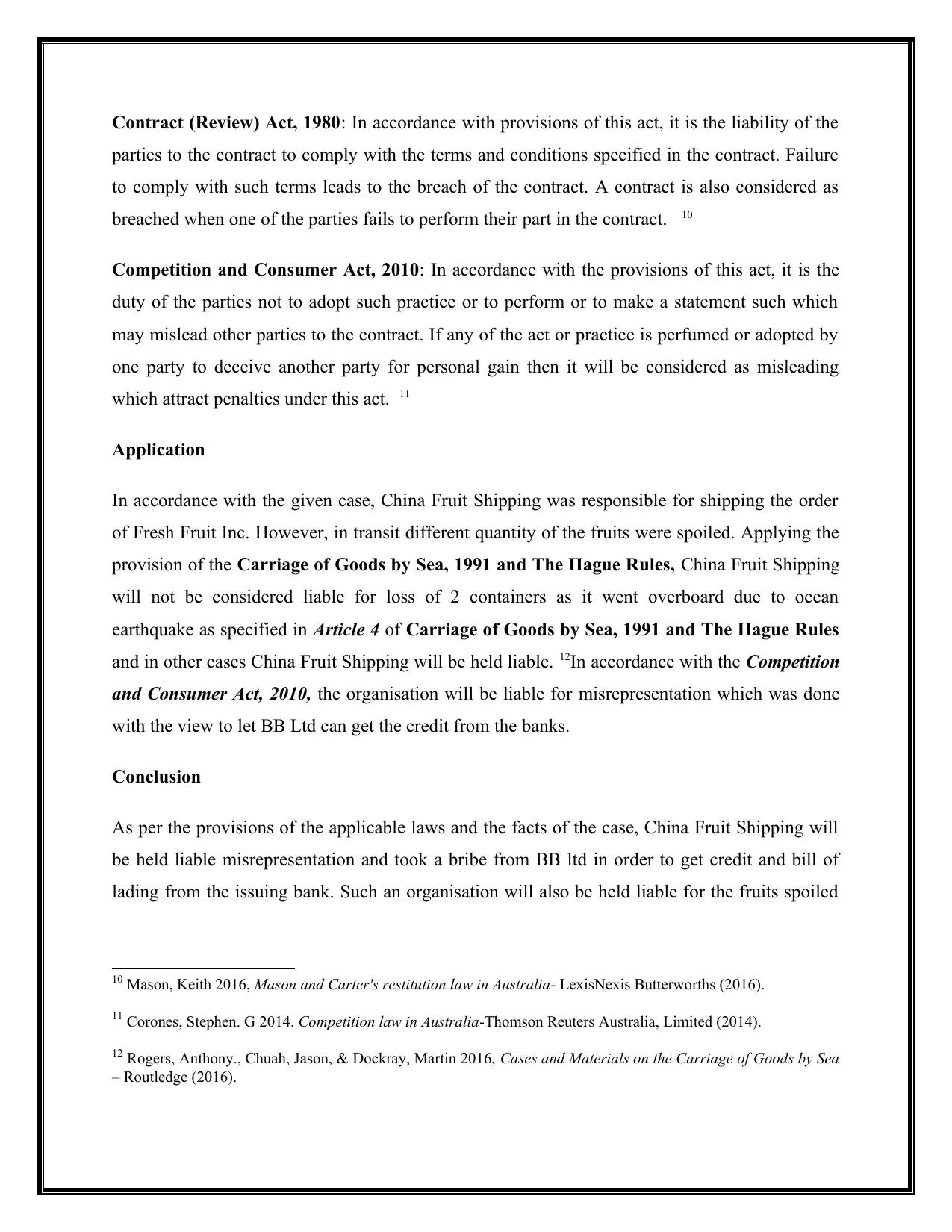
Contract (Review) Act, 1980: In accordance with provisions of this act, it is the liability of the
parties to the contract to comply with the terms and conditions specified in the contract. Failure
to comply with such terms leads to the breach of the contract. A contract is also considered as
breached when one of the parties fails to perform their part in the contract. 10
Competition and Consumer Act, 2010: In accordance with the provisions of this act, it is the
duty of the parties not to adopt such practice or to perform or to make a statement such which
may mislead other parties to the contract. If any of the act or practice is perfumed or adopted by
one party to deceive another party for personal gain then it will be considered as misleading
which attract penalties under this act. 11
Application
In accordance with the given case, China Fruit Shipping was responsible for shipping the order
of Fresh Fruit Inc. However, in transit different quantity of the fruits were spoiled. Applying the
provision of the Carriage of Goods by Sea, 1991 and The Hague Rules, China Fruit Shipping
will not be considered liable for loss of 2 containers as it went overboard due to ocean
earthquake as specified in Article 4 of Carriage of Goods by Sea, 1991 and The Hague Rules
and in other cases China Fruit Shipping will be held liable. 12In accordance with the Competition
and Consumer Act, 2010, the organisation will be liable for misrepresentation which was done
with the view to let BB Ltd can get the credit from the banks.
Conclusion
As per the provisions of the applicable laws and the facts of the case, China Fruit Shipping will
be held liable misrepresentation and took a bribe from BB ltd in order to get credit and bill of
lading from the issuing bank. Such an organisation will also be held liable for the fruits spoiled
10 Mason, Keith 2016, Mason and Carter's restitution law in Australia- LexisNexis Butterworths (2016).
11 Corones, Stephen. G 2014. Competition law in Australia-Thomson Reuters Australia, Limited (2014).
12 Rogers, Anthony., Chuah, Jason, & Dockray, Martin 2016, Cases and Materials on the Carriage of Goods by Sea
– Routledge (2016).
parties to the contract to comply with the terms and conditions specified in the contract. Failure
to comply with such terms leads to the breach of the contract. A contract is also considered as
breached when one of the parties fails to perform their part in the contract. 10
Competition and Consumer Act, 2010: In accordance with the provisions of this act, it is the
duty of the parties not to adopt such practice or to perform or to make a statement such which
may mislead other parties to the contract. If any of the act or practice is perfumed or adopted by
one party to deceive another party for personal gain then it will be considered as misleading
which attract penalties under this act. 11
Application
In accordance with the given case, China Fruit Shipping was responsible for shipping the order
of Fresh Fruit Inc. However, in transit different quantity of the fruits were spoiled. Applying the
provision of the Carriage of Goods by Sea, 1991 and The Hague Rules, China Fruit Shipping
will not be considered liable for loss of 2 containers as it went overboard due to ocean
earthquake as specified in Article 4 of Carriage of Goods by Sea, 1991 and The Hague Rules
and in other cases China Fruit Shipping will be held liable. 12In accordance with the Competition
and Consumer Act, 2010, the organisation will be liable for misrepresentation which was done
with the view to let BB Ltd can get the credit from the banks.
Conclusion
As per the provisions of the applicable laws and the facts of the case, China Fruit Shipping will
be held liable misrepresentation and took a bribe from BB ltd in order to get credit and bill of
lading from the issuing bank. Such an organisation will also be held liable for the fruits spoiled
10 Mason, Keith 2016, Mason and Carter's restitution law in Australia- LexisNexis Butterworths (2016).
11 Corones, Stephen. G 2014. Competition law in Australia-Thomson Reuters Australia, Limited (2014).
12 Rogers, Anthony., Chuah, Jason, & Dockray, Martin 2016, Cases and Materials on the Carriage of Goods by Sea
– Routledge (2016).
Paraphrase This Document
Need a fresh take? Get an instant paraphrase of this document with our AI Paraphraser
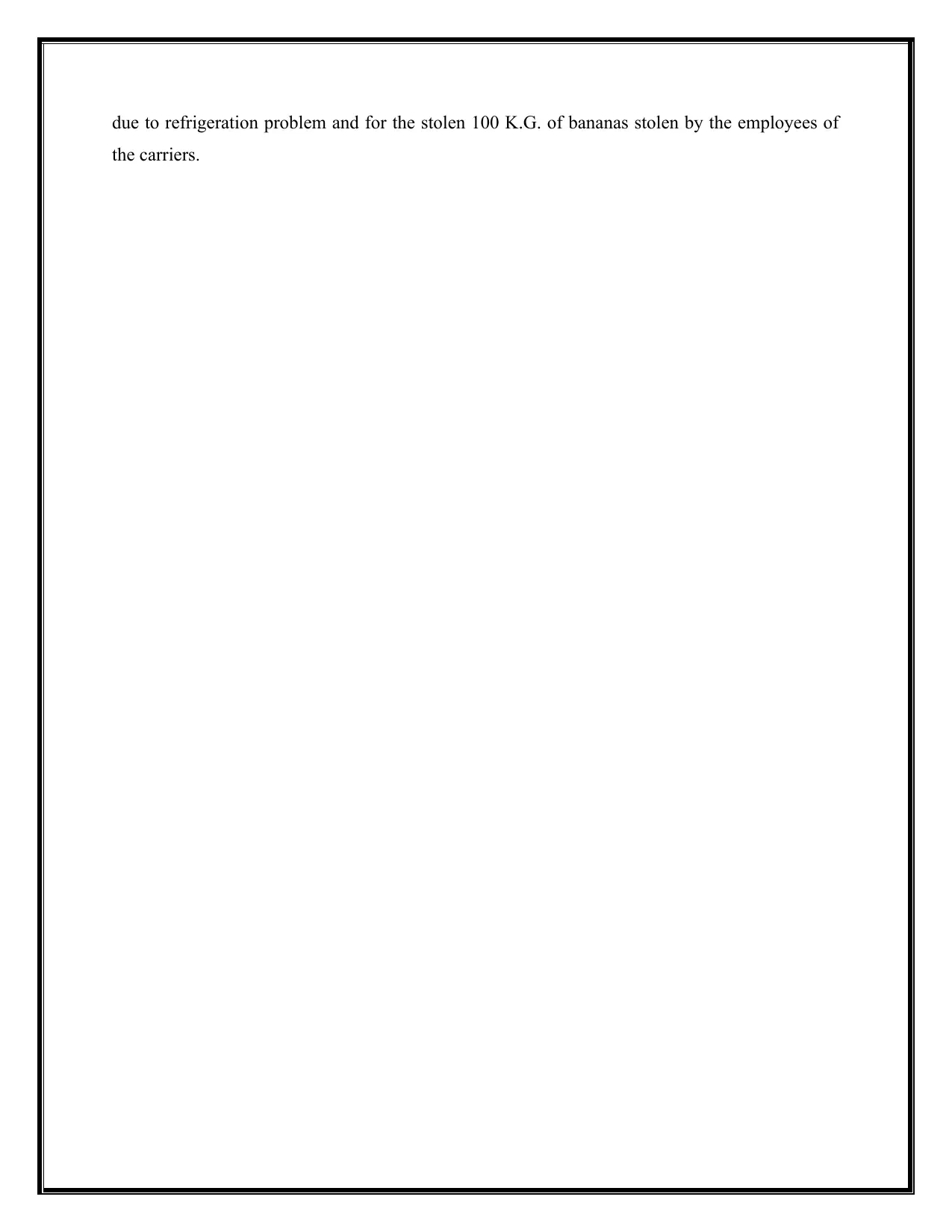
due to refrigeration problem and for the stolen 100 K.G. of bananas stolen by the employees of
the carriers.
the carriers.
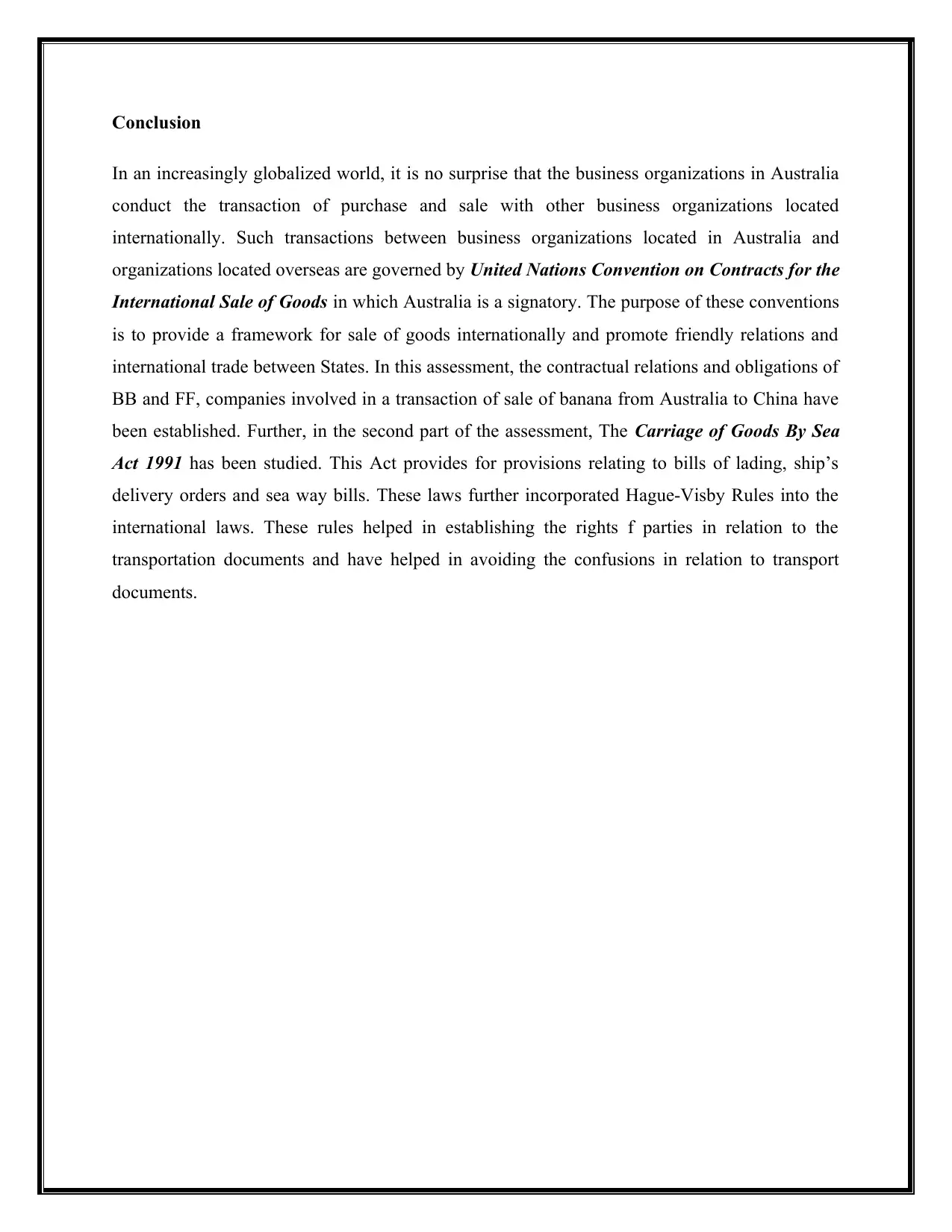
Conclusion
In an increasingly globalized world, it is no surprise that the business organizations in Australia
conduct the transaction of purchase and sale with other business organizations located
internationally. Such transactions between business organizations located in Australia and
organizations located overseas are governed by United Nations Convention on Contracts for the
International Sale of Goods in which Australia is a signatory. The purpose of these conventions
is to provide a framework for sale of goods internationally and promote friendly relations and
international trade between States. In this assessment, the contractual relations and obligations of
BB and FF, companies involved in a transaction of sale of banana from Australia to China have
been established. Further, in the second part of the assessment, The Carriage of Goods By Sea
Act 1991 has been studied. This Act provides for provisions relating to bills of lading, ship’s
delivery orders and sea way bills. These laws further incorporated Hague-Visby Rules into the
international laws. These rules helped in establishing the rights f parties in relation to the
transportation documents and have helped in avoiding the confusions in relation to transport
documents.
In an increasingly globalized world, it is no surprise that the business organizations in Australia
conduct the transaction of purchase and sale with other business organizations located
internationally. Such transactions between business organizations located in Australia and
organizations located overseas are governed by United Nations Convention on Contracts for the
International Sale of Goods in which Australia is a signatory. The purpose of these conventions
is to provide a framework for sale of goods internationally and promote friendly relations and
international trade between States. In this assessment, the contractual relations and obligations of
BB and FF, companies involved in a transaction of sale of banana from Australia to China have
been established. Further, in the second part of the assessment, The Carriage of Goods By Sea
Act 1991 has been studied. This Act provides for provisions relating to bills of lading, ship’s
delivery orders and sea way bills. These laws further incorporated Hague-Visby Rules into the
international laws. These rules helped in establishing the rights f parties in relation to the
transportation documents and have helped in avoiding the confusions in relation to transport
documents.
⊘ This is a preview!⊘
Do you want full access?
Subscribe today to unlock all pages.

Trusted by 1+ million students worldwide
1 out of 13
Your All-in-One AI-Powered Toolkit for Academic Success.
+13062052269
info@desklib.com
Available 24*7 on WhatsApp / Email
![[object Object]](/_next/static/media/star-bottom.7253800d.svg)
Unlock your academic potential
Copyright © 2020–2026 A2Z Services. All Rights Reserved. Developed and managed by ZUCOL.
